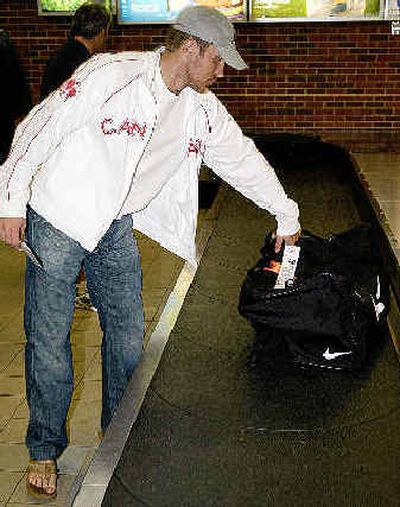NHL owners put season on ice

NEW YORK — The National Hockey League is locking out its players starting today, threatening to keep the sport off the ice for the entire 2004-05 season and perhaps beyond in an effort by management to gain massive change in the sport’s economic structure.
After the long-expected decision was approved unanimously Wednesday by NHL owners, commissioner Gary Bettman repeatedly belittled the union’s bargaining position, talked about the possibility the confrontation could extend into the 2005-06 season and said the conflict has jeopardized the NHL’s participation in the 2006 Winter Olympics.
“If there’s enough time to play some games, we’ll do it,” he said of this season, “and if there’s not, we won’t.”
Bettman called it a “bleak day,” claimed teams had combined to lose more than $1.8 billion over 10 years and cited bankruptcy filings by teams in Buffalo, Los Angeles, Ottawa and Pittsburgh. He said management will not agree to a labor deal that doesn’t include a defined relationship between revenue and salaries.
“Until he gets off the salary-cap issue, there’s not a chance for us to get an agreement,” union head Bob Goodenow said in Toronto, adding that players “are not prepared to entertain a salary cap in any way, shape, measure or form.”
Far apart on both philosophy and finances, the sides haven’t bargained since last Thursday and say they are entrenched for the long run, echoing words of baseball players and owners at the start of their disastrous 7 1/2 -month labor war of 1994-95.
There is almost no chance the season will start as scheduled on Oct. 13, and Bettman told teams to release their arenas for other events for the next 30 days. Bettman said the season can’t extend past June, and the lockout threatens to wipe out the Stanley Cup final for the first time since 1919, when the series between Montreal and Seattle was stopped after five games because of an influenza epidemic.
“The union is trying to win a fight, hoping that the owners will give up. That will turn out to be a terrible error in judgment,” Bettman said. “They are apparently convinced that come some point in the season, the owners’ resolve will waver, and I’m telling you that is wrong, wrong, wrong.”
NHL management claims teams combined to lose $273 million in 2002-03 and $224 million last season. Bettman said the union’s proposals would do little for owners, and said the six offers rejected by the union would lower the average player salary from $1.8 million to $1.3 million.
Goodenow said players had offered more than $100 million in annual concessions.
“The notion that we don’t have competitive balance is absurd,” said Vancouver center Trevor Linden, the union’s president.
Bettman made clear that declaring an impasse under U.S. labor law and imposing new work rules unilaterally was an option, but said it had not yet been considered.
“I think it’s pretty fair to say that we’re at an impasse right now, and my guess is that we’ve probably been at impasse for months, if not a year,” he said. “At some point when we’re at impasse, we could simply say, `We’re going to open and here are the terms and conditions. Let’s go.’ It’s that simple.”
Goodenow said attempting to impose terms would be a “very, very ill-advised strategy” and predicted “the results of it could be catastrophic.”
Bettman said the use of replacement players is not under consideration.
Owners have contributed $300 million to a league fund to help get them through a lockout, and the union has retained licensing money to help its members.
Bettman said about 20 teams would lose less money during a lockout than they would if play continued.
“It is a sad day for all of us,” Montreal owner George Gillett said.
The 30 teams — 24 in the United States and six in Canada — had been set to start opening training camps today, the day after the expiration of the current labor contract.
The deal was first agreed to in 1995 and extended two years later through Sept. 15, 2004. Bettman termed the extension “a mistake, in hindsight.”